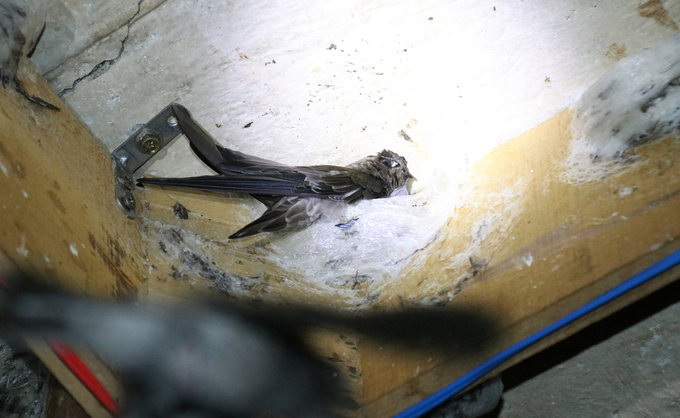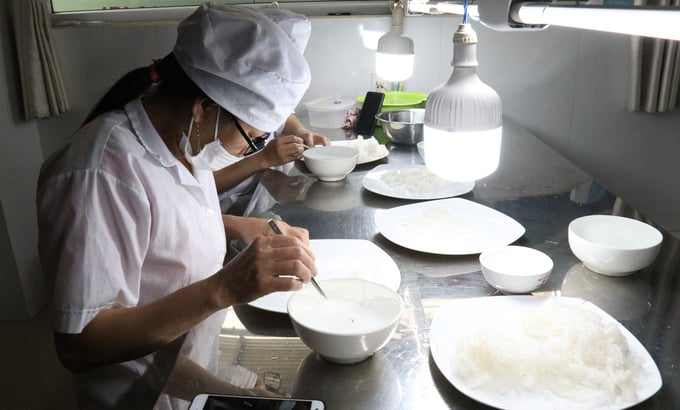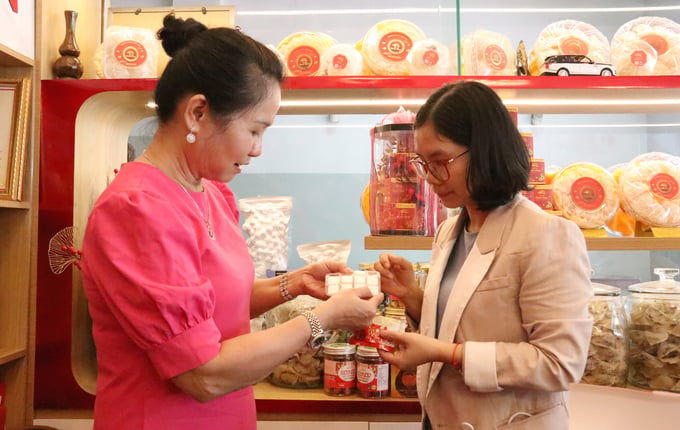June 19, 2025 | 10:36 GMT +7
June 19, 2025 | 10:36 GMT +7
Hotline: 0913.378.918
June 19, 2025 | 10:36 GMT +7
Hotline: 0913.378.918

Currently, bird's nest export procedures still face many difficulties because of procedural difficulties. Photo: Quang Yen.
Mr. Tran An Thinh, director of DAKNET Bird's Nest Ltd.Co, disclosed that the company began swiftlet cultivation in the Krong Pac district in 2015. By 2019, it had established a company to acquire agricultural products for export.
"As soon as the news of official export was made public, the business prepared documents, but a number of obstacles hamper the conclusion of these documents. China requires origin traceability, but Vietnam has not yet provided codes for swiftlet houses and procedures appear redundant, preventing the enterprise from meeting Chinese requirements.
Chinese counterparties demanded proof of origin to determine whether or not the swiftlet products originated in Vietnam or another country. Mr. Thinh stated that the value of Vietnamese bird's nests will increase as a result of official exports, for which the necessary procedures have been completed and enterprises are merely awaiting certification from the relevant agencies.
Mr. Ho Nhat Vy, a member of the Son Hai swiftlet agricultural business family in Buon Ma Thuot City, stated that despite the fact that the protocol between Vietnam and China was signed a year ago, there have been production bottlenecks.

Currently, businesses are still exporting swiftlet products through unofficial channels. Photo: Quang Yen.
"The business began preparing export procedures two years ago, but certification has not yet been issued. Currently, swiftlet colonies are still exported through unofficial channels. Although there are many consumers in China, exports are restricted due to the poor quality of swiftlet nests. Due to a lack of appropriate techniques, swiftlet farmers produce inferior products that do not meet export standards. Mr. Vy was generous.
Mr. Pham Van Hau, chairman of the Swiftlet Nest Association in Dak Lak, stated that the decree was signed more than a year ago and that many enterprises have already prepared the necessary paperwork. However, only one company has signed an export agreement, and it is uncertain when the first shipment will be sent abroad. To ensure that its members' products are consumed, the association has established a variety of connections that allow members to participate and sell their goods.
Historically, the primary export markets for swiftlet nests were unofficial channels to China and other countries, which accounted for 20-30% of total production, while the remainder was consumed domestically. It is anticipated that official exports will increase the price of swiftlet nesting. As demand increases, prices will likely increase.
"At present, the price of swiftlet nests is decreasing due to the revocation of export permits to China for certain countries whose products were found to contain harmful substances. Consequently, these nations have exported a substantial number of swiftlet colonies to Vietnam. As a result of economic downturns, swiftlet nest prices have decreased by roughly 30 percent compared to previous years. Businesses and individuals are awaiting the return of swiftlet brood prices to their previous levels, as explained by Mr. Hau.
According to Mr. Hau, the association will provide technical assistance to farmers in the immediate future. "To satisfy export standards, people must enhance the quality of their nests. Currently, only 10-20% of swiftlet nest production meets China's export requirements. Exports still face numerous obstacles in terms of physical infrastructure and documentation, he said.

Dak Lak is building a project to develop the local bird's nest industry. Photo: Quang Yen.
According to Mr. Vu Duc Con, Deputy Director of the Department of Agriculture and Rural Development in Dak Lak Province, the department proactively assigned officials to participate in c after the decree on inspection, testing, and animal health sanitation requirements for swiftlet nest products exported from Vietnam to China was signed and became effective between the Ministry of Agriculture and Rural Development and the General Administration of Customs of China.
The department collaborated with the Swiftlet Nest Association of Dak Lak Province to organize seminars on "Guidelines for the food safety and hygiene of bird's nests and the refining process for bird's nests, effective swiftlet house operations, and animal health sanitation for swiftlet nests."
According to Mr. Con, bird's nest production companies in Dak Lak Province have already taken steps to satisfy the requirements for registering identification codes and producing products in traceable supply chains that comply with origin standards for exports.
The Department of Agriculture and Rural Development has assigned the Animal Husbandry and Veterinary Sub-department, in coordination with the Animal Health Sub-department of Region V, to conduct multiple rounds of disease monitoring at swiftlet houses in Dak Lak Province, as part of the linkages with large enterprises such as Khanh Hoa Beverage Company and Thanh Dung Trading and Import-Export Joint Stock Company, in order to support exports. In addition, the department is collaborating with the Department of Planning and Investment to finalize the process for submitting a proposal to the Provincial People's Committee for consideration of authorizing the development plan for the swiftlet nest industry in Dak Lak Province, Mr. Con reported.
Translated by Linh Linh

(VAN) To address plastic pollution, closing the plastic recycling cycle will bring significant economic and environmental benefits.

(VAN) According to the Binh Thuan Department of Industry and Trade, in the first five months of 2025, Binh Thuan's dragon fruit export turnover increased by 20.65% compared to the same period last year.

(VAN) EU countries on Thursday gave final approval to new tariffs on fertilizer imports from Russia, a move aimed at cutting off revenue that could support Moscow’s war in Ukraine, despite concerns from European farmers.

(VAN) The working delegation from the Ministry of Agriculture and Environment conducted an important trip to the Netherlands to strengthen strategic partnerships and sustainable development in the agricultural sector.

(VAN) The letter ‘A Plea from the Ocean’ not only evokes emotion but also awakens the human conscience to the responsibility of protecting life on Earth.

(VAN) The Department of Agriculture in South Africa has announced the country’s first mass vaccination of poultry to prevent local birds from contracting avian influenza.

(VAN) Establishment of the Mekong Delta Regional Agricultural Linkage Center, aiming for a closed value chain, deep processing, trading platforms, and international market connectivity.